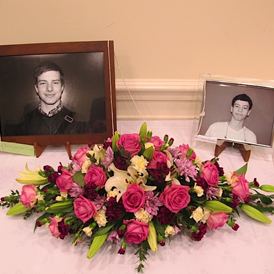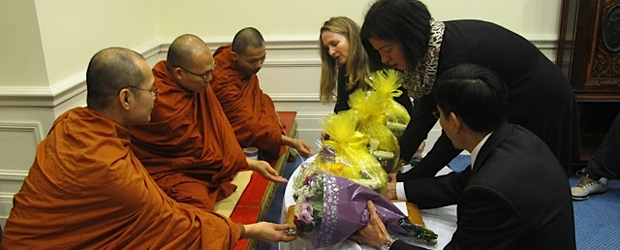The undocumented dangers of Thailand’s roads
It is a top tourist destination – but what the guidebooks don’t tell you is that Thailand’s roads are lethal. Now a group of mothers whose sons died in a bus crash are campaigning to change that.

With the Christmas holidays winding down and the weather closing in, a winter break in the tropical sun starts to sound pretty good. No wonder January and February mark the high point in our unofficial “escape season”.
Among a multitude of tempting destinations, more than 800,000 Britons strap themselves in for the 12 hour flight to Thailand – the majority no doubt, heading for the beach – or the historic, temple-laden cities in the north.
The guidebooks will congratulate you on your choice – the country boasts “international standards” at an “affordable price”. In the “general information” section, you will also read about the dangers of sunstroke and malaria and sexual diseases. What you are unlikely to find however, is one critical bit of information: in Thailand, the roads are lethal.
This is something four British women have recently come to realise. Before starting university, their sons grabbed their backpacks and left for a few weeks of fun and adventure – but their holidays in Thailand would cost them their lives.
Tragic deaths
Bruno Melling Firth, Max Boomgaarden-Cook, and Conrad Quashie – all 19 years old – arrived in Thailand for a 9-week holiday in June. They had saved up all year for a final holiday together before starting university. Four days into their trip, they boarded a night bus in Bangkok. There were heading for the ancient city of Chang Mai, which lies 11 hours by road to the north.
I would have given Max some money to travel by train or plane, if only I had known. Polly Cook
After a break at a road-side rest stop, the bus driver exited using the entrance road. He stopped the bus in the middle of a six lane highway as he tried to gain access to the other lane. The three boys, who were sitting at the back of the bus, saw another vehicle – an intercity bus – hurtling towards them. They even made a joke about it before they were hit.
Five people in total lost their lives – a 20-year-old Korean was also killed. The highway was littered with twisted debris and mangled bus parts. A member of a volunteer ambulance crew captured the scene with a video camera – another gruesome crash site uploaded to YouTube.
Other than an early morning call – the sort all parents dread – the boys’ loved ones were told nothing of how their kids were killed.
Six months later, the mothers of the deceased are still trying to find out why – when they thought bus travel in Thailand was safe.
“You know in many ways, we know very little of the actual accident, we’ve just be finding out bits and pieces,” Gillian Melling – the mother of Bruno Melling-Firth – told Channel 4 News. Gillian, together with Polly Cook, the mother of Max Boomgaarden-Cook, and Amanda Bean, the mother of Conrad Quashie, say the Thai authorities and the UK Foreign Office ignored their requests for information about the crash.

No warnings
We also met a Brighton-based solicitor called Rachel Cooper. She lost her son Felix in Thailand when the driver of the bus he was travelling in lost control and collided with a truck. Felix was thrown across the vehicle when his seat – which wasn’t bolted to the floor – came loose.
“We have looked at the guidebooks and we have looked at the Foreign Office website and there are just no warnings,” Rachel told Channel 4 News.
“Sometimes they say buses ‘may drive fast’ but there are no real warning about the level of danger and the numbers of people who are killed,” she added.
Sometimes they say ‘buses may drive fast’ but there are no real warnings. Rachel Cooper
Finding reliable statistics on the number of fatalities and injuries on the country’s roads is a tricky business. On the one hand, academics told us the numbers recorded by the Royal Thai Police were artificially low. On the other hand, the US State Department has ranked Thailand as the world’s second most dangerous country (after Honduras) in terms of the number of road fatalities suffered by American tourists.
In the course of our investigations, we met hard working officials from the Thai Ministry of Public Health who gave a startling batch of numbers. Using the accepted WHO definition on fatalities caused by road accidents, they told us 13,766 people were killed last year on the country’s roads – more than six times the rate in the UK (which has a similar population to Thailand).
We were told this number could be far higher however, as roughly a third of accidents are thought to go unreported. Incredibly, we were also told that nearly a million people (938,958) were admitted to hospital due to injuries suffered by road accidents last year.
Shocking numbers
The mothers of the four young men were shocked by these numbers – and now want others to know the facts.
“I would have given Max some money to travel by train or plane, if only I had known,” said Polly Cook.
They have pledged to honour the memory of their sons by pressuring the Thai government to raise safety standards – and last week they won themselves a meeting in London with senior Thai officials who have pledged to do more.
It is a start – but the problem is immense. Thai drivers routinely flout the rules and the police rarely bother to enforce them – a situation described to me as “part of the culture” by one senior Thai official. That may be the case – but it is also unacceptable, particularly for a country which sells itself as a modern and desirable tourist destination.
The best thing our mothers can do is remind the Thais of this – I know they are determined to do it.
-
Latest news
-
‘Authentic Stupidity’: Ben Elton’s new show explores how idiotic human beings can be5m

-
Is Israel’s evacuation of Rafah the precursor to full scale invasion?3m

-
Eurovision: Non-binary artist wins for first time2m

-
Tens of thousands march in Georgian capital against ‘foreign agents’ bill2m

-
‘Russia’s number one goal is to get troops closer to Kharkiv,’ says Ukrainian security analyst4m

-




